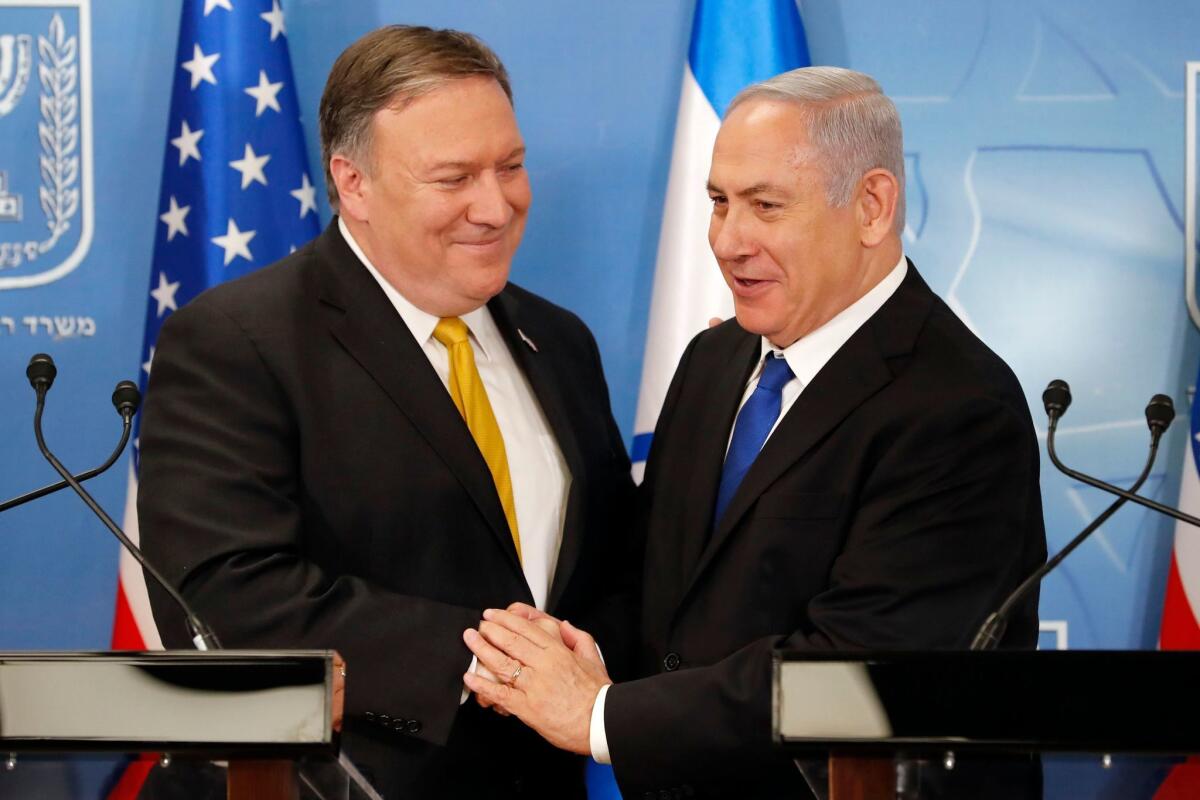Pompeo travels to Israel to give U.S. blessing to annexation of West Bank land

- Share via
WASHINGTON — Secretary of State Michael R. Pompeo headed to Jerusalem on Tuesday to bolster besieged Israeli Prime Minister Benjamin Netanyahu and bestow a U.S. blessing on his country’s proposed de facto annexation of West Bank land claimed by Palestinians.
The visit coincides with Netanyahu’s formation of a new coalition government following his indictment on criminal corruption charges and several inconclusive Israeli elections that failed to deliver power to either Netanyahu or his rival.
It is the first high-level U.S. visit to Israel since President Trump in January unveiled his long-anticipated plan for settling the Israeli-Palestinian conflict — a pro-Israel proposal that was roundly rejected by Palestinians, who were not included in its drafting, as well as most of the Arab world.
To avoid what would have been the fourth national election in a little over a year, Netanyahu and his chief rival, retired army Gen. Benny Gantz, agreed to share power for the next several years. The agreement could clear the way for the new government to extend Israeli sovereignty over large parts of the occupied West Bank, which Palestinians want for a future independent state.
Israel seized the land during the 1967 Middle East War and proceeded to build scores of Jewish settlements, now housing hundreds of thousands of Israelis. The settlements are widely considered illegal under international law.
“We’re glad that there is a now fully formed government in Israel,” Pompeo said ahead of the trip. “As for the annexation in the West Bank, the Israelis will ultimately make those decisions.”
Many believe annexation will be the final nail in the coffin of the two-state solution, the long-cherished notion that creating a Palestinian state alongside Israel would be the best formula for a peaceful end to one of the most intractable conflicts in the Middle East. It would make it much harder to dismantle some Jewish settlements, as had been envisioned in some past peace plans.
The Trump administration, reversing decades of U.S. foreign policy, is ready to welcome Israel’s unilateral annexation of the Jewish settlements, despite fierce opposition by Palestinians, senior U.S. officials said. Pompeo’s visit seems designed to give that approval.
“There’s always a lot to talk about with the Israelis,” assistant secretary of State for the Near East, David Schenker, said when asked about the timing of the trip. “I think it’s fortuitous timing, but this was something that was in the works before we learned of the date of the government formation.”
Under the Trump plan, Israel would also be allowed to take control of the Jordan Valley, the section of the West Bank along the Jordan River and abutting Jordan.
Critics, including many Israelis and U.S. lawmakers, say unilateral annexation will have numerous dangerous ramifications, including damage to long-standing peace treaties that Israel has with Jordan and Egypt, the only neighbors who recognize its existence.
It could also undermine the already-weak Palestinian Authority, the leadership of West Bank Palestinians that has refused to even speak to the Trump administration after its various pro-Israel moves, including the transfer of the U.S. Embassy from Tel Aviv to Jerusalem — a city also claimed by the Palestinians as their capital.
The Trump plan would leave a Swiss-cheese patchwork of Palestinian villages that most experts say could not form a viable state. Critics say annexation would also accentuate the inequities between Jewish settlers and Palestinians, all of whom will continue to live under Israeli control in the West Bank.
“This will be the end of the idea of Israel as a Jewish democratic state and it will be an apartheid state,” said Shaul Arieli, a retired Israeli army colonel and part of a group of former military officials who seek peace with the Palestinians.
The Trump administration has provided “a good umbrella” for Netanyahu and pro-settlement advocates to push away from compromise with the Palestinians, he said.
“Israel can do almost everything it wants,” said Arieli, also a senior advisor to two-state advocate Israel Policy Forum. “Only the U.S. has leverage on Israel, and if they are on [Israel’s] side, the right wing can do everything it wants to cancel the viability of a two-state solution.”
The U.S. ambassador to Israel, David Friedman, has said that the U.S. would recognize annexation “within weeks.”
Pompeo will also use his brief time in Israel to discuss Iran. Since Trump pulled out of the international Iran nuclear deal, Iran has continued to build up its proxies in the region, some of which, like Hezbollah in Lebanon, are seen by Israel as particular threats.
Pompeo “is making this trip because he recognizes the United States and Israel have much to learn from each other as we address current threats, whether those threats stem from a global pandemic or from Iran’s malign regional influence,” Schenker said.
Pompeo will spend barely eight hours on the ground in Israel. His only other international travel since the coronavirus outbreak was a similarly brief trip to Afghanistan in February when the U.S., the Afghan government and the Taliban were attempting to reach agreement on a cease-fire in the United States’ longest war.
More to Read
Get the L.A. Times Politics newsletter
Deeply reported insights into legislation, politics and policy from Sacramento, Washington and beyond. In your inbox three times per week.
You may occasionally receive promotional content from the Los Angeles Times.











